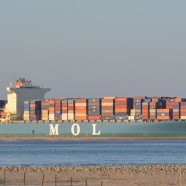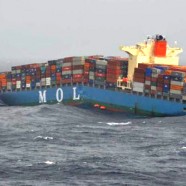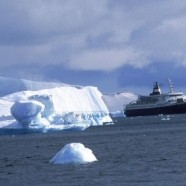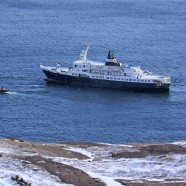The Baguette Effect
MOL Comfort disaster
Subject : MOL Competence, shipwreck in the Bay of the Seine or in the Bay of Biscay?
This container ship is dangerous. Built at Nagasaki in 2008, she is one of the sister ships of the MOL Comfort that was fractured in two parts on June 17 in the Arabian Sea for unknown reasons.
MOL Comfort disaster. Letter sent to the concerning parties
Subject : MOL Comfort disaster – June 17th 2013
Addresses :
The General Secretary of the International Maritime Organization
Those responsible for the delegations of the International Maritime Organization in Iran, Yémen, the Sultanate of Oman, the United Arab Emirates, Pakistan, India, Japan, Egypt, and the Bahamas (MOL Comfort flag)
The President of the Mitsui OSK Lines Company
The Commissioner of Transports of the European Union
The Commissioner of the Environment of the European Union
The Prime Minister of Japan
The Minister of Transportation of France
The Achilles Heel of Global Commerce
Mol Comfort disaster
A 316 meter long container ship broke in two after some hours of undulation in the Arabian Sea. The MOL Comfort was transporting the equivalent of 7,040 standard sized containers. The fate of the front and rear sections, and the number of containers that fell into the ocean, are uncertain. The Arabian Sea is one of the world’s busiest shipping routes; it connects the Indian Ocean and the Mediterranean Sea by the Suez Canal.
The MOL Comfort in the process of snapping in two on June 17, 2013
Photo IANS – Indo-Asian News Service
Delivery of nuclear fuel to Japan. Position of Robin des Bois
The new Japanese Nuclear Safety Authority (NRA – Nuclear Regulation Authority) is considered independent. It will publish this summer 2013 a collection of basic safety rules and prescribe generic or specific work to each nuclear site in the archipelago.
These preventive improvements will take several months to a few years. They will be carried out under the precondition that the political decision to relaunch nuclear power is affirmed and accepted by civil society.
The risks of a transoceanic shipping of spent fuel containing plutonium are unacceptable today, particularly because of political, military and nuclear tensions between North Korea, South Korea and Japan.
Sank ?
Lyubov Orlova – Press release # 5
According to the Rescue Coordination Center at Halifax in Canada, the Lyubov Orlova’s emergency beacon went off during the night of Saturday February 23rd. The most likely hypothesis would be that the Lyubov Orlova has sunk. The emergency beacon was either installed on the cruise ship or on one of the lifeboats onboard. It went off at 51°46.00 N and 35°41.00W i.e.: 1,700km (1,000 nm) from the European coastline which is to say closer than the National Geospatial-Intelligence Agency reported on February 21st.
Lyubov Orlova – Press release # 4
Lyubov Orlova – Press release # 4
If the latest news transmitted by the US maritime information services are confirmed, the Lyubov Orlova is closer to the American shores than the European ones.
Consequently, Robin des Bois asks Canada to initiate and finance all operational means in order to recapture the vessel and bring her back in a place of refuge. Thereafter, Canada, where the Lyubov Orlova had been seized in September 2010 and later on abandoned, should propose a new dismantling plan, different from the initial one. Scrapping the Lyubov Orlova in a unreliable ship-breaking yard in the Dominican Republic would be an additional scandal indeed.
Canada Vandalizes the Atlantic
Lyubov Orlova, Press release # 2
The decomissioned cruise ship Lyubov Orlova, now drifting in the Atlantic, is the responsibility of the Canadian authorities. Bearing the flag of the Cook Islands, the Lyubov Orlova was abandoned in the port of Saint John in Newfoundland in 2010, supposedly headed for demolition in the Dominican Republic after being sold by a Canadian broker to a Canadian resident of Iranian origins with interests in Saint-Domingue. Canada, the most recent country to harbour the cruise ship previously used for Arctic cruises, arranged for the Charlene Hunt, a tug boat constructed in 1962, to tow the ship on January 23. Shortly after the depart of the two ships, the tow cable broke, setting the Lyubov Orlova adrift. Due to security reasons, the Charlene Hunt was forced to return to the port of Saint-John. After the discovery of several deficiencies during the inspection of the vessel by the Canadian authorities, the Charlene Hunt must remain in port. Instead of inspecting the Charlene Hunt before its departure with the Lyubov Orlova in tow, as would have been in compliance with international maritime regulations, the Canadian authorities waited until after its return to port ; demonstrating a serious lack of foresight considering the requirements for a trans-oceanic towing.
For scrap and adrift, this is Canada’s motto
Lyubov Orlova, Press release # 1
Canada often sends its used commercial vessels to be broken up a long way away, in particular in Turkey.
In September 2011, the Canadian Miner, bound for Aliaga (Turkey) under tow, broke her towline, drifted and ran aground on Scatarie Island, in Nova Scotia. The cost of cutting and dismantling was evaluated at 24 million $. The wreck is dislocating and is a threat to the environment and the local fisheries. The Canadian Miner is still stranded on the island. The removal operations have been cancelled.
Lyubov Orlova, the ghost ship
Lyubov Orlova. IMO 7391434. Passenger ship. Length 100 m, 2,695 t. Cook Islands flag since 2009. Classification society Russian Maritime Register of Shipping. Built in 1976 in Kraljevica (Croatia) by Titovo. Detained in 2002 in Saint Petersburg (Russia). Former Soviet passenger ship owned by Far Eastern Shipping Company (Fesco) from Vladivostok ; acquired in 1986 by the Lubov Orlova Shipping Company, Malta based with Russian capital. This vessel with a capacity of 122 passengers was finally chartered by Cruise North Expeditions, an Inuit company which assigned her on their summer cruises in the Northern Canada. (Hudson and Baffin Bay …). As a result of salaries not paid to her 51 crew members and debts to her bunker suppliers she was seized on September 25th, 2010 in St John (Newfoundland, Canada). She was replaced by her sister-ship the Bahamian Clipper Adventurer (ex-Anna Tarasova) managed by International Shipping Partners, Miami. On August 27th, 2010, the Clipper Adventurer ran aground on a reef in the region of Nunavut, threatening the Canadian Arctic Ocean (Cf. “A new contaminated site in the Arctic”). The Lyubov Orlova was sold as is for an unknown destination of demolition. US $ 275 per ton.














